[Christina Reyes, NISGUA Internacionalista, wrote and sent this letter in early January 2020. It now includes modifications they made in early March 2020 for International Women’s Day]
Hello loved ones,
I hope this message reaches y’all in a time and space where the world isn’t weighing so heavily on y’all, even though I know it’s difficult. Sending you all love, patience and solidarity. I have learned and unlearned a lot of things. More importantly, I am learning about my own processes, boundaries and more about how I understand and hold my visions for a future. With that said, this International Women’s Day I hope we are able to celebrate but also reflect on our multitude of identities. That patriarchy is interwoven and not separate from racism, classism, ableism, colonialism etc. That the category “woman” is not monolithic. That trans women are women. That p*ssy hats are useless and essentialist/genitalia-based assignations are harmful. That non-binary folks aren’t “women” unless they say so, that femme does NOT equal woman. I hope we can flood the streets, show-up and care for one another without upholding toxic beliefs/norms. I hope that as we recognize and appreciate work that has been done we can also account for past mistakes so that together we can shape beautiful, amazing healthy futures. It’s all so beautiful yet complicated. I hope y’all are constantly envisioning better realities than the one we are living in, and that the spark to create and recreate is still bright. Commit to those visions. We need you.
TW/CW: Mention of sexual violence and death
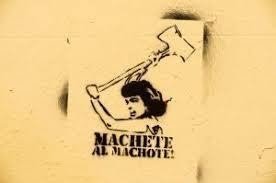
Photo credit: a gift from the international feminist movement.
DEFINITIONS
Patriarchy:
a system of male and masculine domination; “a sociopolitical and cultural system that values masculinity over femininity”; “Patriarchy perpetuates oppressive and limiting gender roles, the gender binary, transphobia and cissexism, sexual assault, the political and economic subordination of women” femmes, trans folks, and gender non-conforming folks
Capitalism:
an economic system in which a country’s trade, industry, and profits are controlled by private companies, instead of by the people whose time and labor powers those companies; an economic system whose sole purpose is to generate profit by any means necessary
Colonialism:
when one country violently invades and takes control of another country, claims the land as its own, and sends people — “settlers” — to live on that land; defined as “the policy or practice of acquiring full or partial political control over another country, occupying it with settlers, and exploiting it economically” colonialism also refers to “the specific form of cultural exploitation that developed with the expansion of Europe over the last 400 years” and more recently the expansion of the US (i.e. Puerto Rico, Guam are current US colonies). There are different types of colonialisms (explained below).
Settler-colonialism:
“Settler colonialism is different from other forms of colonialism in that settlers come with the intention of making a new home on the land, a homemaking that insists on settler sovereignty over all things in their new domain…In the process of settler colonialism, land is remade into property and human relationships to land are restricted to the relationship of the owner to his property.”
“In order for the settlers to make a place their home, they must destroy and disappear the Indigenous peoples that live there”
Examples of settler-colonial nations: Canada, the United States, Australia, and South Africa
from Decolonization Is Not a Metaphor
Neo-Colonialism:
coined by Kwame Nkrumah, the first President of Ghana, to refer to when “ex-colonial powers and the newly emerging superpowers such as the United States continued to play a decisive role in their (independent ex-colonies) cultures and economies through new instruments of indirect control such as international monetary bodies, through the power of multinational corporations and cartels which artificially fixed prices in world markets, and through a variety of other educational and cultural NGOs (Non-Governmental Organizations)”; Nkrumah argued that neo-colonialism was more insidious and more difficult to detect and resist than the direct control exercised by classic colonialism; used to refer to any and all forms of control of the ex-colonies after political independence
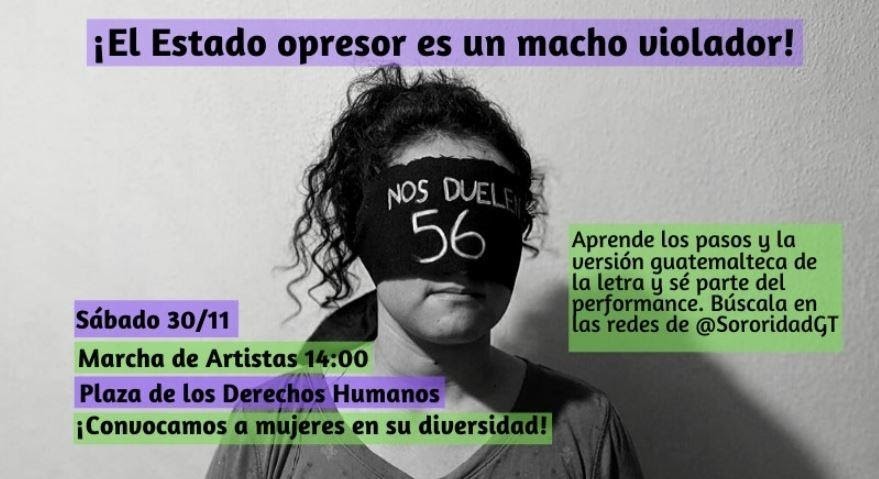
Photo credit: NosDuelen56+1 on Facebook
After it started in Chile, the “Un violador en tu Camino” performance spread quickly and found space here in Guatemala. Above is the flyer of a protest that happened a couple of weeks ago against state and patriarchal violence in the capital. It’s based on the understanding that the state upholds, perpetuates, and relies on patriarchal violence in order to retain power and to continue to exist. The flyer makes reference to the Hogar Seguro Virgen de la Asuncion tragedy where 56 girls were locked in a room of a supposed “safe house” as punishment for trying to escape abuse. They weren’t allowed to leave the room, not even to use the bathroom. As a form of protest, the girls lit a mattress on fire expecting that the staff and/or the police present would let them out once they realized there was a fire in the room. Officers of the national police of Guatemala (PNC) were stationed right outside of the room the girls were locked in, but refused to let them out despite their screams, and the hogar’s manager (who had the key to the room) preferred to let them burn. That night, 41 girls died while another 15 were severely burned. Hogares seguros (“safe houses”) in Guatemala are supposed to function as orphanages and as “safe” homes for kids who experience intrafamily violence or whose families don’t have the resources to sustain them, but the reality is that hogares seguros are hubs for violence, child abuse, trafficking and exploitation. The Virgen de la Asuncion case clearly depicts this reality. The girls in the hogar experienced violence at the hands of their supposed “care-takers” and were then murdered by the state.
This is part of a systematic issue directly tied to patriarchy, classism, the state and power. The girls represented a vulnerable population in Guatemala – poor disenfranchised girls who were seen as disposable in the eyes of the state because of their class standing and family situation.
The situation in Guatemala is not unique. In the US, 4 out 5 Native American womxn experience various types of violence. The Missing and Murdered Native Women and Girls initiative is seeking to find justice for our indigenous relatives in the US who are being targeted by state and patriarchal systems. Women and femmes all over the world are hurting and being killed.
– More on Hogar Seguro
– Update on Hogar Seguro Case
– Recent attacks on Esteba Celada, lawyer of the Hogar Seguro case
– More info on MMIW
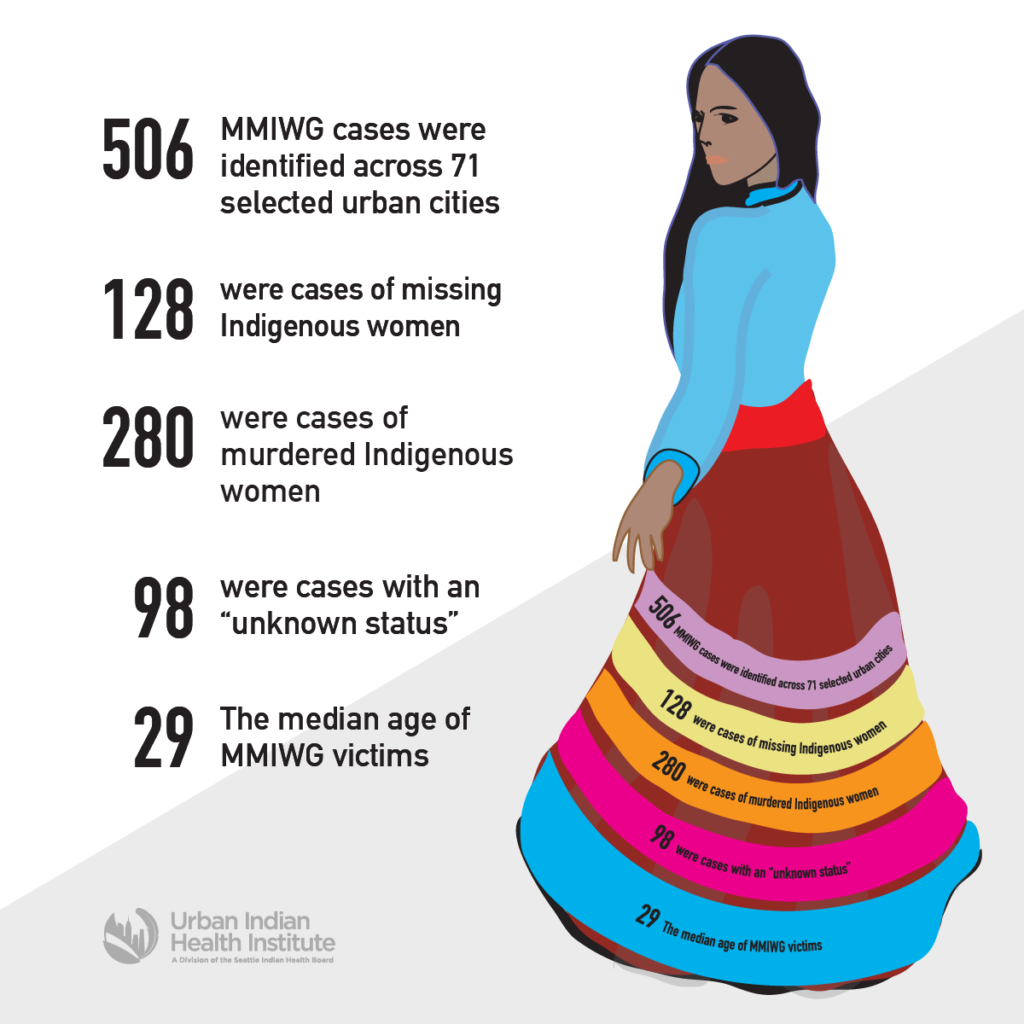
Photo credit: Urban Indian Health Institute
In Guatemala, the fight against patriarchy and the state is continuous and multilayered. Angelica Choc, an Indigenous Maya Q’eqchi leader, is one of the many Indigenous women spearheading this fight. She’s seeking justice for the murder of her husband who was killed by the Compañía Guatemalteca de Níquel (Guatemalan Nickel Company), owned by Swiss company Solway. Solway is trying to build Latin America’s biggest nickel mine on Q’eqchi territory. Angelica is also supporting the fight of 11 Q’eqchi women who were gang raped during forced evictions in El Estor, Guatemala, that were carried out by police, military, and the mining company’s private security forces. The fight against patriarchy is a fight against state violence is a fight against neocolonialism.
Angelica’s lucha and the case of El Estor are symptoms of a neocolonial system that continues to violate Indigenous communities’ rights and territories while using sexual violence as a weapon for profit and gain, something that dates back to the era of settler-colonialism. Indigenous women all over the world are being attacked and are facing mass violence, yet they continue to resist and fight for the generations to come.
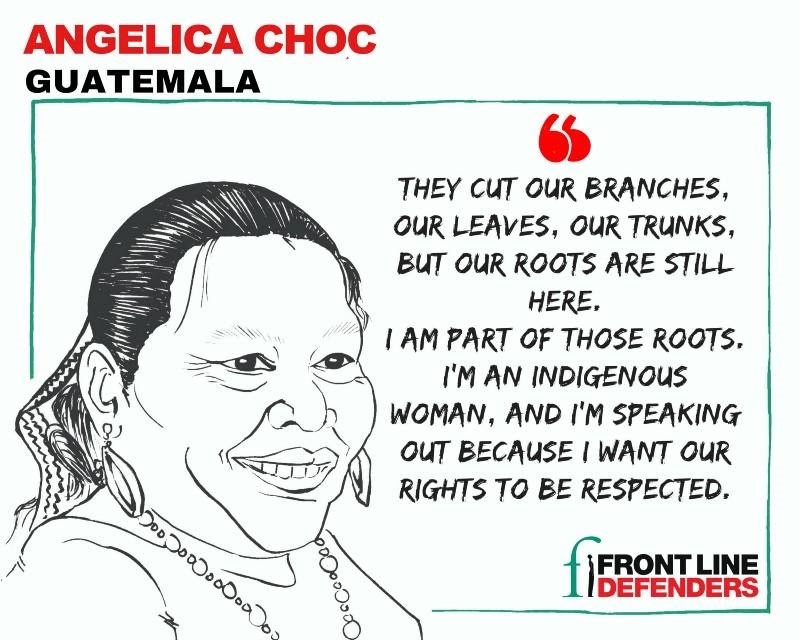
Photo credit: Front Line Defenders
I also want to take some space to write about the idea of “progress” and how it’s inherently tied to colonial and capitalist thinking. Capitalism necessitates us to constantly extract (labor, natural resources, emotions etc.) for the sake of profit, and “progress” is used to justify this. It’s tied to the belief that Indigenous communities are “non-progressive,” that they are somehow antiquated and in need of modernization. This is the driving force of colonialism and the mass genocide of Native peoples throughout the Americas along with stealing and extracting as many natural resources as possible. The more you extract, the more profit you can accumulate, and profit drives capitalism.

Photo credit: Christina Reyes
We must divest from this mentality. It’s what led to climate change and the mass genocide of native peoples. The word “progress” has been weaponized countless times in the US and elsewhere to justify genocide throughout history, and it is now being used by the state and mega-projects in Guatemala to justify the theft of land and killing of community leaders who dare to protect themselves, their communities and their territories.
The Hogar Seguro Virgen de la Asuncion tragedy, Angelica Choc’s work, and El Estor’s situation, are all reflections of how these systems attack in various different ways in Guatemala, how re-colonizing land and peoples is linked to patriarchy and capitalism, and how the state benefits from all of this. This is an issue that we see in other parts of the world as well. We see it with the #NoDAPL movement in the US, the Missing and Murdered Indigenous Women and Girls movement and Wet’suwet’enin struggle Canada, the fight of Berta Caceres and the Lenca community in Honduras, the fight of the Zapatistas in Mexico, the Free Palestine movement, India’s current occupation of Kashmir and so many other ongoing struggles.

Photo credit: Christina Reyes
Mural on Zapatista Territory
Translation:
DO NOT GIVE UP
Please do not give in
even if the cold burns
even if fear bites
even if the sun hides
and takes the wind
there is still fire in your soul
there is still life in your dreams
I want to end by sharing a couple of thoughts and notes from the Second Annual Zapatista Encuentro de Mujeres que Luchan/ International Gathering of Women Who Struggle held on Zapatista territory in Mexico that I had the privilege of attending. The encuentro was beautiful in so many ways. The Zapatistas opened their land and resources to over 3,000 women and femmes with the purpose of uniting visions and facilitating a discussion on gender violence. In the opening words given by Comandanta Amada, I felt urgency. Complete militant urgency. Comandanta Amada reminded us that although the world tells us we are “progressing,” at the end of the day women and femmes are still being killed all over the world. And what does any of the “progress” mean when our Black and Brown trans sisters are being murdered and hurt every day? When our Indigenous relatives are being displaced and killed all over the world? When women, femmes and non-binary folks still have to constantly fight for our right to exist? I couldn’t shake the pain and deep appreciation I found in her words and reminders.
The encuentro was from December 26-29th, and while there was so much joy and radical love around, white supremacy still found its way inside. A lot of white women (some with dreads, others w/out) took up a lot of space that wasn’t theirs, and at times it felt like they treated this sacred land and convocation as a music festival rather than an opportunity to deepen understanding of struggle within different international contexts. I felt conflicted trying to enjoy the beauty present those days while also noticing so many other hurtful and violent dynamics. It really highlighted that there is so much work to do. That while we might be united by some struggles, there is still a lot that needs to be learned and unlearned. Despite all of that, I really appreciated and hold closely the conversations I had in those 3 days. I left with a reawakened hope of the many possibilities we still have and firm commitment to my visions.
To me, The Zapatistas represent the beauty and radical visions we can make our reality when we commit to our radical visions for the future–what we can create when we are uncompromising, unwilling to give up, and determined in our fight–what can happen when we do not give into institutional, governmental and reformist options no matter how hard it gets–when we value autonomy and community above all. Like the mural says, do not give in, there is still fire in our souls, there is still life in our dreams and that is something none of these systems can destroy.
VIDEO of Mujeres Zpatistas (MUST WATCH!!!)
Click for the opening statement given by Comandanta Amada (Spanish w/ English translation available)
Click for closing statement given by Comandanta Yesica (English)
Click for more information about the Zapatistas and their lucha (Spanish)
Click for more info about the Zapatistas (English)
como siempre, with Revolutionary love and care,
Christina

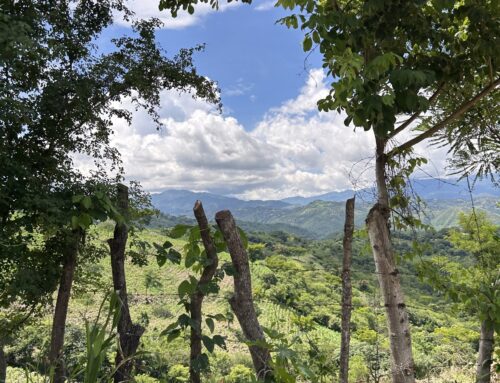
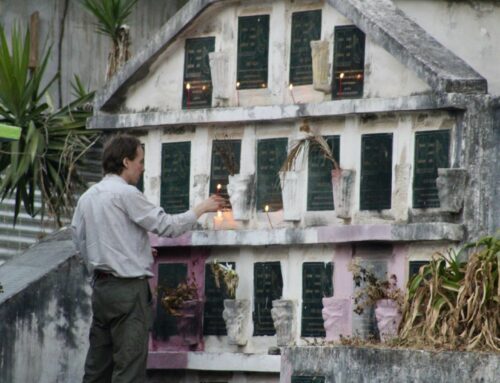
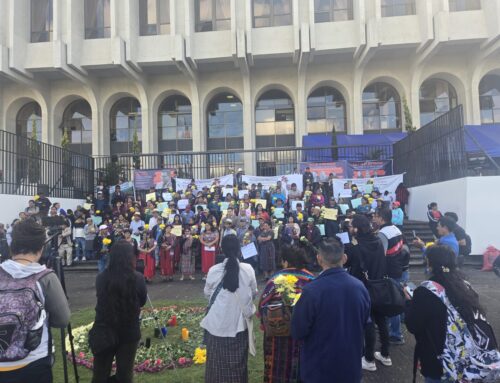
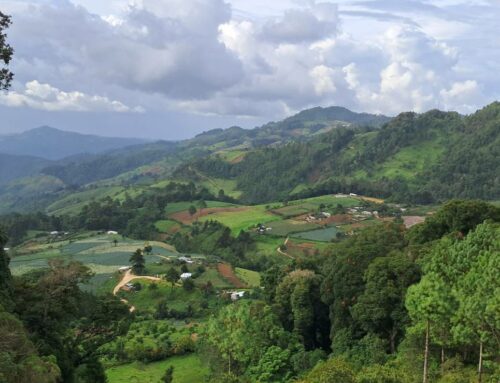
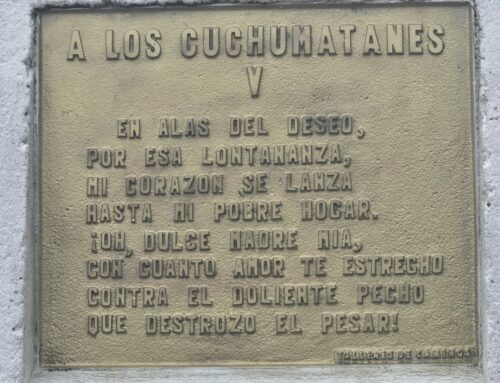
Leave A Comment